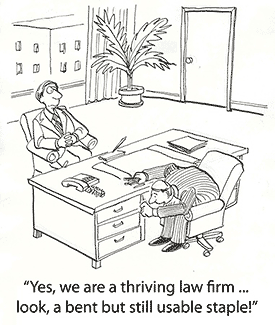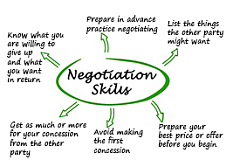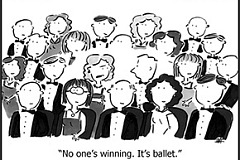 The Law of Power says: The person with the greater power, real or imagined, will get the better deal in any negotiation.
The Law of Power says: The person with the greater power, real or imagined, will get the better deal in any negotiation.
Your ability to recognize both your power and the power of the other person is critical to your success in negotiating. Often you have more power than you know. [quotesright]Often the other party has less power than he appears to have. [/quotesright] You must be clear about both.
The first corollary of the Law of Power says: “No one will negotiate with you unless they feel you have the power to help them or hurt them in some way.”
You must have something the other person wants, or you must be able to withhold something he wants for the other person to take you seriously. You must be continually thinking about the situation from the other’s point of view so that you can position yourself for the maximum benefit to yourself.
The second corollary of this law says: “Power is a matter of perception; it is in the eye of the beholder.”
You can often create the perception of power, of being able to help or hinder a person in some way, with boldness and creativity. Often when I am getting poor service on a flight or at a hotel, I will take out my pen and a piece of paper and politely but coldly ask the other person, “May I have your name please?”
[quotes]This invariably draws them up short.[/quotes] They hesitatingly offer their name while they mentally scramble to figure out who I might be and why I might be asking. I then ask them for the correct spelling. I carefully write the information down and put it away. From that moment on, the service improves dramatically. Whoever it is cannot take a chance that I might be a senior person in the company or someone who personally knows a senior person.
The three most important keys to negotiating are power, preparation, and timing, and [quotesright]of these three, power is often the most important and the most persuasive. [/quotesright]
10 Different Types of Power
There are 10 different types of power that you can develop and use, either individually or together, to influence and persuade the other party in any negotiation. The more important the issue to be negotiated, the more time you should take to consider how you can use one or more of these elements of power to strengthen yourself and your position.
- The first is the power of indifference. The party who appears to be the most indifferent to whether the negotiation succeeds often has power over the other party if that other person wants the negotiation to succeed more than he does. As a rule, you should always appear slightly detached and indifferent in a negotiation, as though you don’t really care one way or the other.
- The second form of power is the power of scarcity. Whenever you can suggest or imply that the item you are selling is in scarce supply and that there are others who want it, so that the item will soon be sold anyway, you can influence the negotiation in your favor.
It is quite common in sales to suggest that a particular item has been so popular that it is almost out of stock, and the item that you are looking at is the last one that they will have in stock for some time. [quotesright]Sometimes, people don’t even realize how badly they want something until you suggest that they may not be able to get it at all. [/quotesright]
- The third form of power is that of authority. When you have an impressive title or you look as though you have the authority to make decisions, this image alone often intimidates the other person and enables you to get a better deal.
In his book, Winning Through Intimidation, author Robert Ringer talks about bringing two lawyers and a real estate agent with him to a meeting to discuss a real estate deal. The presence of three high-powered people at the negotiation enabled him to demand and get better prices and terms than he might have otherwise.
With regard to authority, a powerful image can really help you. Dress excellently, in every respect. Dress with power, in strong, conservative colors, looking like the president of a major corporation. When you look like a million dollars, the other party, especially if he or she is not as well dressed, will often be intimidated into giving you a better deal or will be much more responsive to your demands.
- The fourth form of power is that of courage. You create the perception of courage by being willing to take risks, by speaking out clearly and forcefully and by being willing to either put yourself on the line for this deal or walk away from it. Whenever you act courageously by speaking up and demanding what you want, and offering to stand behind your demands, you demonstrate the kind of courage that gives you an image of power.
- The fifth type of power is commitment. When you appear totally committed to making a negotiation a success, to finding a way to overcome any obstacle to agreement, you radiate an aura of power that often causes people to cooperate with you and go along with you.
- The sixth form of power is that of expertise. The power of expertise comes from your making it clear that you are extremely well informed on the subject under negotiation. A person who is perceived as an expert in any situation has power over those who do not feel as knowledgeable. [quotesright]The more research and preparation you have done in vance, the more knowledgeable you sound. [/quotesright]
- The seventh form of power you can create is called “knowledge of the needs of the other.” You develop this form of power by finding out everything you can about the other person before you begin negotiating. The more time that you take to find out exactly the situation of the other person, the more power you have in the negotiation.
Victor Kiam, the owner of Remington Corporation, tells about his negotiating for the purchase of a smaller company. The owner was asking a price of about two million dollars. He had stated that the company was in extremely good shape, and therefore, worth every penny of it. Victor Kiam found out who the bankers were for the company and then, by using his connections, found that the company was approaching insolvency and that the owner was desperate to sell.
Armed with this inside information, he was able to negotiate a much better price in the eventual purchase of the company. Knowledge of the true needs of the other gave him a distinct advantage.
- The eighth form of power you can develop is that of empathy. Human beings are predominantly emotional in everything that they do and say. When they feel that the person they are negotiating with empathizes with them and their situation, they are much more likely to be flexible and accommodating in the negotiation
[quotesright]The picture of the tough-talking negotiator is largely fictitious. [/quotesright] Every study of top negotiators shows that they are highly empathetic, low keyed, solution-oriented and pleasant individuals to do business with. Good negotiators are usually very nice people. They make it clear from the beginning that they really care about finding a solution that everyone can live with.
- The ninth form of power you can use is that of rewarding or punishing. When the other party perceives that you have the capacity to help them or hurt them, they are usually far more cooperative than if they don’t feel you have this power.
- The tenth and final form of power in negotiating is the power of investment, either of time of money, or both. When you make it clear that you have invested a lot in the issue under negotiation, it gives you a form of power that you would not have if you had spent less time and effort.
For example, when I purchased my current house, I sat down with the owner and told him that my wife and I had looked at more than 150 houses and that this was the first house that we had decided to make an offer on.
Even though the seller had only had the house on the market for a few weeks, he recognized immediately that we were serious and he negotiated with us in a serious way, leading to a satisfactory sale for him and a satisfactory purchase for us. If we had told him that this was one of the first houses we had looked at, his attitude might have been completely different.
In each case, your choice in negotiating is either to be influenced by, or to have influence over, the other party. [quotesright]The more of these elements of power that you can develop and use to your advantage in a negotiation, the more persuasive and effective you will be. [/quotesright]
How you can apply this law immediately:
- Prior to your next major purchase, sale or negotiation of any kind, review the different forms of power described here and think about how you can use them to give yourself an advantage. Write out and discuss your thinking with someone else to be sure that you are completely prepared.
- Practice the power of indifference in every negotiation as a matter of course. When you appear unconcerned or uninterested in the success of the negotiation, [quotesright] you will often unnerve the other party[/quotesright] and induce concessions from him before you have even taken a position or made an offer.
- from "THE 100 ABSOLUTELY UNBREAKABLE LAWS OF BUSINESS SUCCESS" – Brian Tracy














